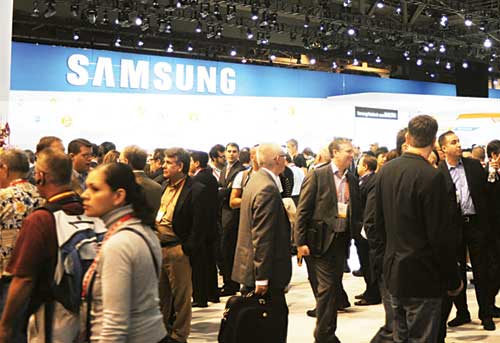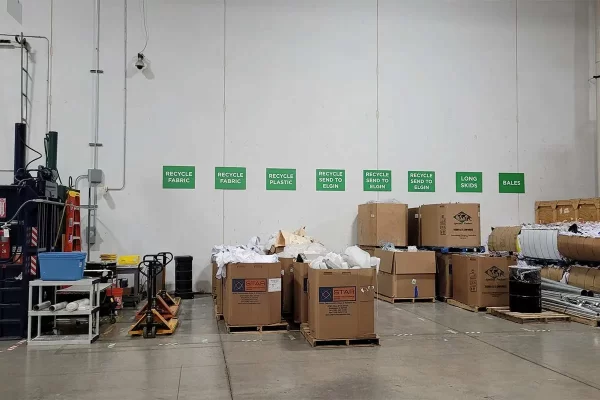While a tradeshow might seem to be an unlikely place for cloak-and-dagger activity, the real threat of industrial espionage requires thwarting many types of crime while helping ensure the safe participation of authorized show attendees and exhibitors.
There are obvious security risks when a tradeshow’s floor is open for visitors, the primary ones being theft and unauthorized access. But tradeshow security goes beyond simple property protection, many times winding up being about preventing accidental injury as much as crime.
“As in any type of event where there is a concentration of people in a contained area, one of the biggest risks is the safe movement of people,” said Anthony Ramirez, president and CEO, Lincoln Security. “Some of the immediate risks would be overcrowded entrances, backed up escalators and elevator breakdowns.”
Fortunately, a dose of common sense can help prevent many potential crowd problems.
“A good example would be an instance where the registration area is just beyond the top of the escalator,” said Ramirez. “When attendees reach the top, they congregate in front of the escalator, causing a backup. Identifying high-traffic areas such as these and placing a security guard in these areas can drastically reduce the amount of incidents and injuries during the course of an event.”
Communicating concerns regarding potential security issues or safety problems during an event also helps maintain show floor security.
“Any reliable security company should work with exhibitors in advance and during a tradeshow as often as possible to inform them of any issues or concerns,” said Anthony Seda, owner, All Purpose Security.
And there are many ways to work with exhibitors in advance.
“First and foremost would be an offer to hire a dedicated security guard for the booth during off hours,” said Ramirez. “Secondly, an email blast to exhibitors with a ‘security tips bulletin’ keeps the tips fresh in the exhibitors’ minds. Another way to communicate with exhibitors is through the use of social media by the security contractor. This can keep exhibitors current on security issues at a moment’s notice.”
Show floor security issues often revolve around the potential for theft, accidents, security breaches and access by unauthorized personnel. But, when it comes to actual criminal activity, some events understandably are more vulnerable than others.
“It all depends on the show. High profile shows, such as a jewelry show, have more of a potential security breach if the guard is not alert,” said Seda.
But theft could be as much of intellectual property through espionage as much as stealing something of a more tangible value, such as an electronic component.
“In the current age of camera phones, small cameras, iPads, etc., we have a hard time policing unauthorized photography on the show floor during event hours. While we do our best to curb this practice, it is a problem,” said Ramirez. “Another crucial time is immediately after the show closes and attendees are exiting. Attendees or exhibitors with bad intentions may use this time to pass through a competitor’s booth to snap a couple of photos. This practice can be curbed by hiring a security guard for your booth with specific instructions to not allow photography.”
While there are security risks during a tradeshow’s run, the nature of those risks tends to differ from those encountered before and after the show.
“During setup and dismantling, merchandise is left unattended and in view of any potential criminals, which makes it more of a potential crime,” said Seda. “During the show, too many people in one area can create a distraction for potential crime. But there is a greater risk during installation and dismantling because the criminals will try to blend in with the staff and attempt to obtain any easy access to any unarmed or improperly supervised areas.”
If a theft or other crime does occur during a tradeshow, police officers tend to be nearby to assist victims. But their involvement might not go beyond helping file a police report.
“Local police involvement varies from city to city. For the most part, local security contractors have off-duty officers on staff who work on a part-time basis,” said Ramirez. “In some cities, you have the ability to hire uniformed officers directly from the police department of that city. Most cities also have a non-emergency number that is used for reporting thefts of high-dollar items on the show floor.”
So whether looking to protect intellectual property, prevent the loss of expensive equipment or to simply ensure attendees’ safety when exhibiting, tradeshow security is as much the responsibility of exhibitors as it is tradeshow organizers. But a dose of common sense and timely communication can prevent many potential security breeches as well as the loss of costly equipment during a tradeshow’s run.






























